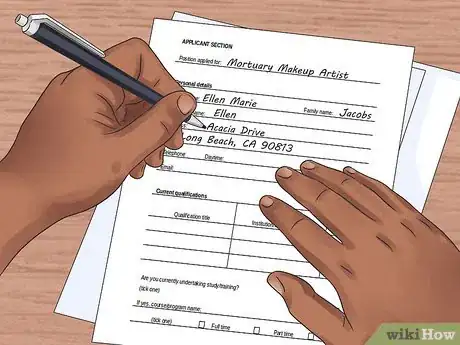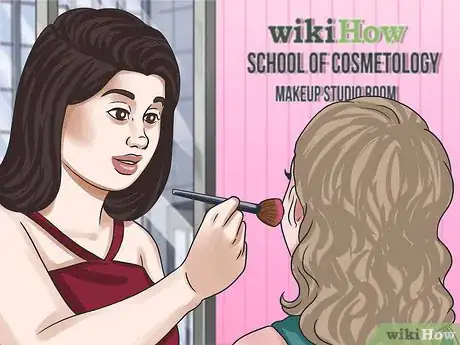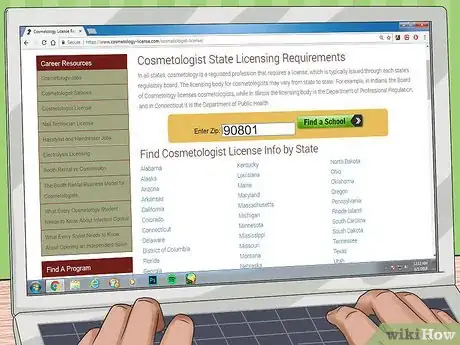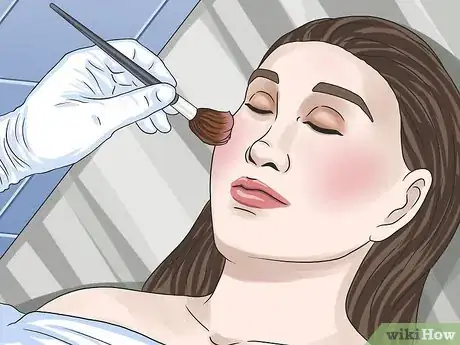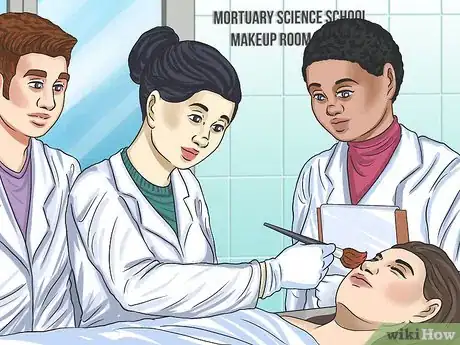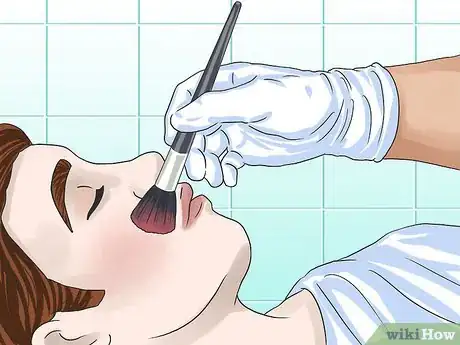This article was co-authored by wikiHow staff writer, Jessica Gibson. Jessica Gibson is a Writer and Editor who's been with wikiHow since 2014. After completing a year of art studies at the Emily Carr University in Vancouver, she graduated from Columbia College with a BA in History. Jessica also completed an MA in History from The University of Oregon in 2013.
This article has been viewed 64,185 times.
Learn more...
To find a career in mortuary makeup, “desairology,” pay attention to job postings at funeral homes. Talk with the funeral home director about the posting so you're on the same page about expectations, pay, and time commitment. It's important to meet the basic requirements if you plan on applying for the position. If you want to increase your chances of getting the job, get as much experience as possible and consider getting additional mortuary skills to make you a well-qualified candidate.
Steps
Finding and Applying for the Job
-
1Spread the word about your services among local business. List your services online and leave business cards at salons that don’t have a mortuary makeup artist on staff. Making connections within the community can lead to referrals, individual freelance jobs, or a full-time position.
- Keep in mind that there will be more opportunities and higher-paying mortuary makeup artist jobs in highly populated areas.
-
2Reach out to funeral homes in your area. Contact your local funeral home director and ask if they need a makeup artist. Many funeral homes will list job postings as needed so call or check their website frequently.
- Ask the funeral home director if they can put you on their list of potential makeup artists.
Advertisement -
3Respond to a job posting. Once you find a job posting for a mortuary makeup artist, fill out an online application or ask the funeral home for a paper application. Fill out the application with your contact information, job experience, and references.
- You'll also have to give the director a copy of your cosmetology license and show them a portfolio of your work.
-
4Discuss terms of the job. If you're genuinely interested in the job, find out if the job is full-time or freelance. For example, you may be offered contracts on an individual basis. Then talk with the director about the pay and job expectations.
- If you're just starting out, the job may start as an on-call or contract position. Once you've built up a bigger portfolio, you might be able to negotiate your position.
Meeting Basic Requirements
-
1Graduate from high school or get your GED. Graduating high school is crucial to continuing your education as a mortuary makeup artist. Make sure to get your diploma or GED in order to apply to mortuary science school or cosmetology school.
- Consider taking science classes such as biology, chemistry or physics and vocational cosmetology courses.
-
2Complete your cosmetology associate’s degree. If you're not going to become a funeral director or embalmer, you'll have to get your cosmetology degree in order to work with the deceased. To get your degree in cosmetology, complete:[1]
- 1,000-1,500 hours of training in makeup, hair, and nails.
- Courses in desairology, if offered.
- General courses towards your associate degree.
-
3Get your state cosmetology license. Check with your state to fulfill its requirements for becoming licensed. You'll have to take a licensing examination which includes a written test and practical test where you'll style someone's makeup and and hair.[2]
- Some states charge a separate exam fee as well as a license application fee.
- If you don't pass the exam the first time, check with your state to determine how many times you can take the test.
- Find your state’s requirements by checking the American Association of Cosmetology School's website or contact your state directly.
-
4Create a portfolio of your work to show potential clients and employers. Include clear, well-lit pictures of different makeup looks that you’ve completed, along with some before and after pictures. Your portfolio should only include pictures of living clients, but it can still show potential employers your skills and strengths.
- Your portfolio can either be online or in a physical binder, with the pages tucked into transparent sleeves.
-
5Keep all of your paperwork in 1 place. To make it easier to apply for job openings, store all of your application materials in 1 place. Store a copy of your cosmetology or mortuary science license, paperwork showing that your immunizations are up-to-date, and your work portfolio.
- Bring your file of paperwork with you to any job interviews or funeral home director meetings.
Improving Your Qualifications
-
1Volunteer your services to gain experience. If you're struggling to get a job because of your lack of experience, respectfully tell friends and family that you're trying to find clients. Offer to do their funeral makeup for free so you can practice your skills. Pre-arrange everything with the client, including makeup preferences and choosing a reference photo to work from.
- If you already have plenty of experience, continue to do this type of freelance work as a way to earn income in addition to your funeral home work.
-
2Attend mortuary science school for an emphasis on funeral home work. If you'd like to increase your chances of getting a mortuary makeup artist job, get mortuary qualifications. You can train across a wide range of mortuary skills so you qualify for more mortuary positions.[3]
- Training in multiple mortuary fields will make you a more attractive job candidate at smaller funeral homes where they may not be able to hire a large staff.
-
3Ask to apprentice under another mortuary makeup artist. Since it may be difficult to get experience without landing a job first, contact local mortuary makeup artists and ask if you can learn from them.
- Keep in mind that most apprenticeships are unpaid.
- It's important to have your cosmetology license before you begin an apprenticeship because you'll probably be working with deceased bodies.
-
4Get on the job training. If you can’t find a mentor or a way to get lots of experience, don’t worry. Many mortuary makeup artists get their initial experience after they’ve gotten their first job. As long as you have your training and license, you are still a viable candidate for a mortuary makeup artist position.
- Many funeral homes will want to train you according to their preferred practices.
Community Q&A
-
QuestionHow much do these professionals earn?
 Community AnswerAccording to the Bureau of Labor, in 2018 mortuary makeup artists made an average salary of $39,932. Artists with less than 3 years of experience made around $29,980.
Community AnswerAccording to the Bureau of Labor, in 2018 mortuary makeup artists made an average salary of $39,932. Artists with less than 3 years of experience made around $29,980. -
QuestionWhere can I find universities with cosmetology classes or mortuary classes?
 Community AnswerSimply do an internet search for colleges or universities with cosmetology or mortuary classes and programs.
Community AnswerSimply do an internet search for colleges or universities with cosmetology or mortuary classes and programs.
References
About This Article
To get a job as a mortuary artist, start by contacting local funeral homes to see if they currently need a makeup artist. If you find an open position, fill out the job application with your contact information, job experience, education, and references, then submit it online or in person. Don't forget to include a copy of your cosmetology license and a strong portfolio that features clear, well-lit pictures of your best work! For tips on improving your qualifications, read on!


